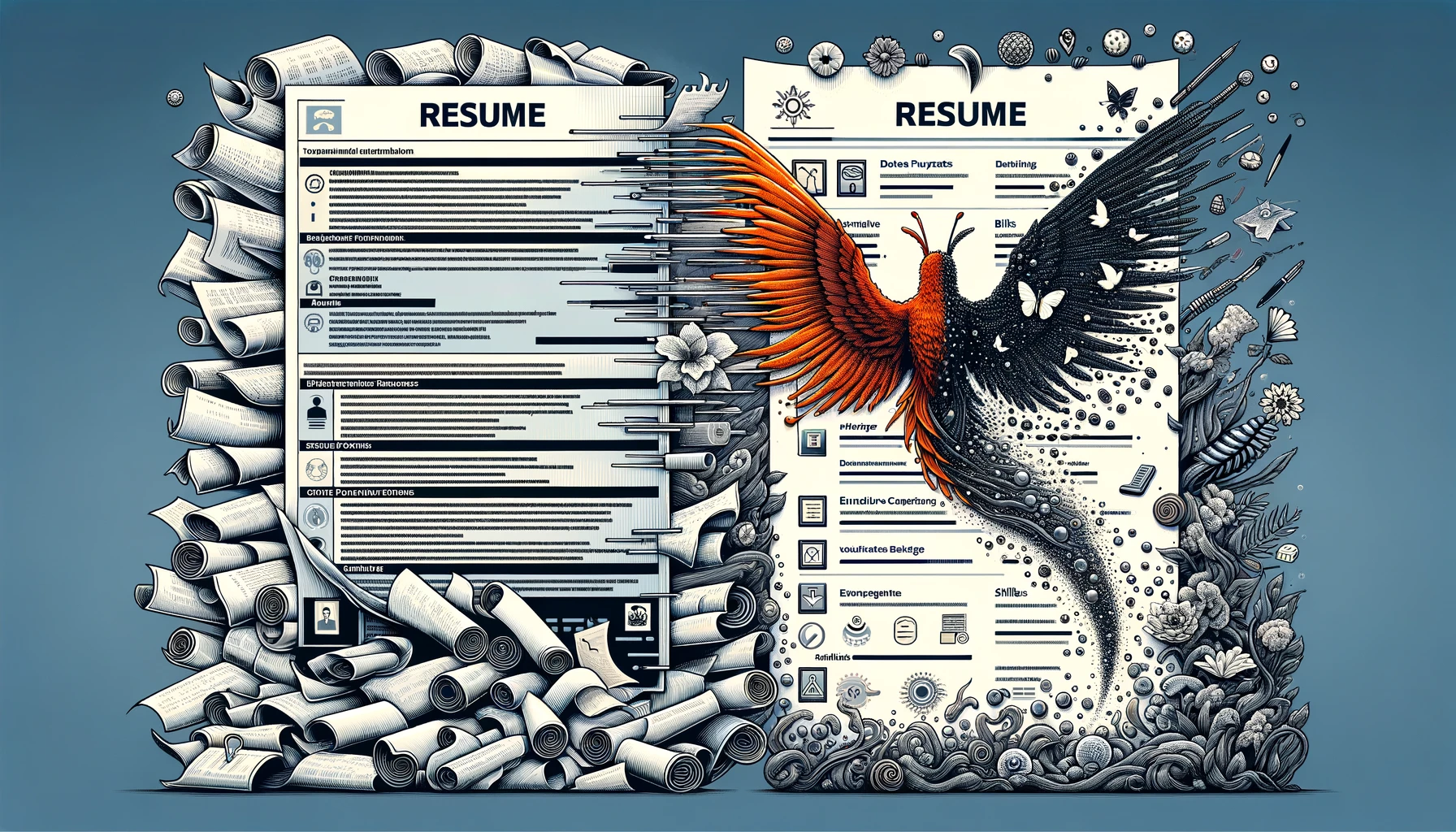Introduction
When creating a resume, an insurance agent can showcase their qualifications and experience in a way other professionals may be unable to.
Because of this, insurance agents need to understand the key elements that should be included in a resume.
This article will review the fundamentals of creating an excellent resume for insurance agents.
We’ll provide an overview of what an insurance agent resume should include, tips and tricks for preparing a great resume, advice for choosing the correct format, and how to create each section of the resume.
At the end of this article, you’ll have the knowledge and tools you need to create an effective resume for an insurance agent.
With the correct information and preparation, you can ensure your resume stands out from the rest and helps you get the job you deserve.
Let’s start by looking at the contents of an insurance agent’s resume.
Overview of Insurance Agent Resumes :
Any resume for an insurance agent must include the standard resume elements such as contact information, work experience, and skills.
However, certain elements are unique to insurance agents.
For example, insurance agents should include their certifications, licenses, and training in their resumes. This section should list all of the credentials that an insurance agent holds.
In addition, insurance agents should include an overview of any awards or recognitions they have received. This section can be short and sweet, but it helps to demonstrate to potential employers that the insurance agent has gone above and beyond in their field.
Finally, insurance agents should include a resume summary or objective statement. This section should contain a few sentences summarizing the insurance agent’s qualifications. It should also have a few sentences about the insurance agent’s career goals.
Now that we’ve gone over the basics of an insurance agent resume let’s look at how to write one.
How to Write A Resume
Writing a resume can seem daunting, but it doesn’t have to be. By breaking down the process into manageable steps, you can quickly create a great resume to showcase your qualifications and make a lasting impression on potential employers.
Essential Components to Include:
The first step in creating your resume is to include all the essential components. Start by listing your contact information at the top of the page, including your full name, address, phone number, and email address.
After that, include a resume summary or objective statement that briefly outlines why you’re a good fit for the job and what you can bring to the organization.
In the work experience section, include your most recent job positions and a brief description of your duties and accomplishments. Make sure to include your job title, the name of the company, the dates you worked there, and any relevant details about the job.
In the skills section, highlight any skills or qualifications you have that are relevant to the position you’re applying for. Make sure to include technical skills, as well as any soft skills, such as communication and problem-solving abilities.
In the certification, licenses, and training section, list any certifications, licenses, or training courses you have completed related to the job. Finally, don’t forget to include any optional credentials, such as awards, volunteer experience, or extracurricular activities.
Formatting the Resume:
Once you’ve included all the essential components of your resume, the next step is to format it correctly. Start by choosing the right type of resume format for the job. There are three main types of resumes – chronological, functional, and hybrid.
A chronological resume is the most common type and is an excellent choice if you have a solid work history directly related to the job you’re applying for. It’s organized chronologically, with your most recent employment first.
A functional resume focuses more on your skills and experience than your work history. It’s a good choice if you have gaps in your work history or a varied work history.
Finally, a hybrid resume combines elements of both the functional and chronological formats. It is an excellent option for experienced professionals who want to showcase their work history and relevant skills.
Use a clear and concise format, no matter which type of resume you choose. Use consistent font sizes and styles, and leave enough white space so the resume is easy to read. Finally, be sure to proofread your resume carefully to avoid errors.
Writing Your Resume:
Now that you’ve included all the essential components and formatted your resume, it’s time to start writing. Start by writing a resume summary or objective statement that briefly outlines why you’re a good fit for the job and what you can bring to the organization.
In the work experience section, include your most recent job positions and a brief description of your duties and accomplishments. Use strong and specific language to show employers why you’re an excellent fit for the job.
In the skills section, highlight any skills or qualifications you have that are relevant to the position you’re applying for. Make sure to include technical skills, as well as any soft skills, such as communication and problem-solving abilities.
In the certification, licenses, and training section, list any certifications, licenses, or training courses you have completed related to the job. Finally, don’t forget to include any optional credentials, such as awards, volunteer experience, or extracurricular activities.
Once you’ve written your resume, make sure to proofread it carefully. Ask a friend or family member to read it to ensure it’s error-free. With a great resume, you’ll be well on your way to impressing potential employers and securing your desired job.
Preparing A Great Resume
Optimizing your resume for a career as an insurance agent requires careful consideration and effort, but it’s well worth it. A few essential tips and tricks can help you create an effective resume that will stand out from the competition.
Choosing a resume format best suited to the role you’re applying for is crucial. Popular resume formats include chronological, functional, and hybrid.
Chronological resumes list work experience in reverse chronological order and are best suited to roles where you’re applying for the same or similar positions.
Functional resumes focus on your skills and abilities and are best for jobs where you have a range of transferable skills.
Hybrid resumes are a combination of chronological and functional resumes and are best suited to roles where you want to highlight your skills and work experience.
Once you’ve chosen the best format for your resume, it’s time to start filling it out. Your contact information should be at the top of the document and include your full name, address, phone number, and email address. This allows recruiters and employers to contact you quickly and easily.
Your resume summary or objective statement should also be included at the top of the document. The resume summary should be short and sweet, summarizing your skills and experience concerning the role you’re applying for. An objective statement is more targeted and should explain why you’re the best candidate for the position.
The work experience section should include a detailed list of past roles and responsibilities. This should include the name of the organization or company you worked for, the dates you worked there, and a few bullet points outlining the tasks you completed and the results or achievements you achieved.
Your skills section should include a list of your skills relevant to the role you’re applying for. Make sure to include soft skills as well as hard skills, and be sure to list any certifications, licenses, or training you have.
If you have any optional credentials or awards, these can be included in their separate section. This can consist of awards, honors, or professional memberships. Make sure to include the year or date you received the prize or credential and any organization associated with it.
Finally, you can use an online resume builder to quickly and easily create an effective resume. Many of these services provide templates you can customize to fit your needs. This allows you to focus on the content and ensure that your resume is optimized for the role you’re applying for.
To create an effective resume for insurance agents, be sure to choose the proper format, make sure your contact information is up-to-date, create a practical summary or objective statement, include relevant work experience, list your relevant skills, include any certifications, licenses, and training, and have any optional credentials.
Additionally, you can use an online resume builder to quickly and easily create a great resume.
Choosing The Right Format
When creating a resume for an insurance agent, it is essential to choose the correct format to ensure it looks professional and conveys the right message to the reader. Different resume formats are best suited for different scenarios, so it is vital to be familiar with the options and to choose a design that best suits the job you are applying for.
The three most common types of resume formats are chronological, functional, and combination.
A chronological resume is the most commonly used format, and it focuses on listing your work experience in reverse chronological order, starting with your most recent job.
This is the best format to use when you have a consistent work history and are applying for a position similar to your previous work experience.
A functional resume focuses on listing your skills and accomplishments and downplays your work experience. This is a good option when you have gaps in your work history or want to emphasize your skillset over your work experience. Employers less widely accept this format, so it is vital to use it sparingly.
Finally, the combination resume is a mix of chronological and functional formats. This type of resume allows you to highlight your work experience and skills equally. This is the best option for those with an inconsistent work history who want to emphasize their work experience and skills.
Another thing to consider when choosing a format is the employer’s preferences. Many employers have specific requirements for resume formats, so it is essential to check if the employer has any particular needs before applying.
Finally, keeping the resume tidy and professional is important when choosing a format. Use consistent formatting throughout the document and leave enough white space between each section. Avoid using too many fonts, colors, or images, as this can be distracting and make the document look unprofessional.
Choosing a suitable format for your resume is an essential step in creating an effective resume for an insurance agent. Consider the different formats available and choose one that best suits your work history and the job you are applying for.
Be sure to check the employer’s preferences and keep the resume looking professional and easy to read.
Contact Information
The contact information section of your resume is the first thing potential employers will see. It serves as an introduction and provides them with the most essential information about you. This section should include your full name, postal address, phone number, and email address.
It is important to keep this section clear and concise when formatting it. You should use a professional font that is easy to read and ensure that each line of text is aligned correctly. To ensure that your contact information stands out, you can use a larger font size than the rest of the resume.
Another critical thing to consider when formatting the contact information section is to ensure the information is accurate and current. This is important because potential employers can only contact you if the information is correct. Including a professional voicemail message is also a good idea if you cannot answer prospective employers’ calls.
When providing your address, it is usually best to use the same address for all of your application materials. This will make it easier for employers to contact you if they need to send additional documents or materials. Additionally, having the same address on all of your documents will help to create a sense of consistency.
While including a profile image on your resume is unnecessary, having a professional headshot as part of your contact information can be helpful. Incorporating a picture can create a positive impression and provide a sense of trust and reliability. Pick a professional-looking photo that resembles your appearance in an in-person interview.
Finally, include a professional email address appropriate for a job search. Professional email addresses typically use your name or initials in the address, such as yourname@email.com. This type of address is more likely to make a good impression on potential employers than an email address that uses a nickname or has an unprofessional domain.
By including accurate and professional contact information on your resume, you can give potential employers the confidence to contact you for an interview. With the correct information and formatting, this section can make a great first impression and help get your resume to the top of the pile.
Writing The Resume Summary or Objective Statement
The resume summary or objective statement is a short section at the top of your resume that gives employers a quick overview of who you are. It should highlight your key qualifications, skills, and experience. It is important to craft a compelling summary statement that will draw the attention of hiring managers and recruiters.
Focusing on your strengths and accomplishments is crucial when writing a resume summary statement. Please consider this section your brand and use it to showcase your most impressive skills and qualifications. Make sure to tailor the information to the job you are applying for, emphasizing the qualifications and experiences most relevant to the role.
When writing a resume objective statement, focus on your career goals and ambitions. Explain why you are interested in the role and how your qualifications make you a great fit. Make sure to highlight your skills and experiences that would make you a great candidate for the job.
It is essential to be concise and clear when writing your summary or objective statement. Keep the idea to one or two sentences, and use strong action verbs to make a powerful impression. Examples of action verbs include analyzing, developing, implementing, leading, organizing, and supervising.
When constructing the statement, use a professional yet friendly tone. Avoid phrases such as, “I am looking for a position where I can learn and grow.” Instead, focus on how you can contribute to the organization and be specific about the skills and qualifications you would bring to the role.
Finally, it is important to proofread your summary or objective statement thoroughly. Double-check for grammar, punctuation, or spelling errors, and be sure the information flows smoothly. This section of your resume sets the tone for the rest of your application, so it is essential to ensure it is flawless.
Work Experience Section
The work experience section is a crucial part of the document when compiling a resume for an insurance agent role. It is essential to make sure this section is well-structured and detailed. Here are some tips on what to include in the work experience section and how to format it.
First, listing your jobs chronologically, starting with the most recent experience, is important. Make sure to include the title, company, dates of employment, and a brief description of your role. The description should be concise but provide enough detail to show each position’s responsibilities and achievements clearly.
It is also essential to include any relevant industry experience. If you have worked as an insurance agent in the past, be sure to include that experience and highlight any relevant skills or accomplishments. Include that if you have experience in other insurance-related roles, such as customer service or sales.
For each job, you should also provide a list of key accomplishments. These should be quantifiable whenever possible, such as “Achieved a 25% increase in sales” or “Reduced customer service response time by 20%.”
Finally, be sure to include any relevant volunteer or extracurricular activities. If you have held leadership roles in professional or community organizations, those should be included in the work experience section.
Overall, the work experience section of an insurance agent’s resume should be comprehensive and well-structured. It should provide a clear overview of your professional background and highlight any relevant skills and accomplishments related to the insurance industry.
By following these tips, you can ensure your work experience section will make a great impression on potential employers.
Skills Section
A well-written skills section is crucial for any resume, especially for an insurance agent. Even if you have a great work experience section, it won’t mean anything if you don’t present the right skills. This section should accurately reflect your abilities so employers can quickly and easily identify your skills.
When writing a skills section, it’s essential to focus on the specific skills necessary for the position. Generally, the skills should be related to the duties and responsibilities of the position and should be relevant to the job you’re applying for. To ensure you’re including the right skills, it’s important to read the job description carefully.
When writing a skills section for an insurance agent, it’s vital to include communication, customer service, and problem-solving skills. Insurance agents need to be confident when communicating with clients and should be able to respond to customer inquiries quickly. Additionally, they need to be able to assess customer needs and recommend the best insurance plan for them.
It’s also important to include technical skills related to the insurance industry, such as knowledge of underwriting, claims processing, and risk management. Insurance agents should also list any certifications, such as the Chartered Property Casualty Underwriter (CPCU) certification, that they may have.
Creating a skills section is important to use active language that describes your abilities. You should also use bullet points and action verbs to make the section easily scannable since employers may be skimming your resume. Additionally, avoid listing generic skills, such as effective communication, and focus on skills more specific to the position.
Creating a well-crafted skills section ensures employers can quickly and easily identify your skills. You can ensure your resume is eye-catching and effective by including the right skills and avoiding generic ones.
Certification, Licenses, and Training
If you’re applying for a job as an insurance agent, you must ensure that your certification, licenses, and training are current. This section of your resume should demonstrate that you have the experience and credentials needed to fulfill the position.
The certification, licenses, and training section should include any certificates or licenses you hold relevant to the job you are applying for. This might consist of a license to sell insurance, a certification as a financial advisor, or a professional designation. Ensure to include the name of the certifying agency, the date it was obtained, and any additional relevant information.
You should also include details of any formal training you have received in the insurance field. This should include the course’s name, completion date, and other pertinent information. If you’ve taken classes relevant to the job but not specific to insurance, include those.
Your resume should also include any continuing education courses you have taken since completing your initial studies. These courses help to demonstrate your commitment to staying up-to-date with the latest developments in the insurance field. Ensure to include the courses’ names, the completion date, and other relevant information.
Finally, if you have attended any conferences or seminars related to the insurance industry, include that information. This could include the dates of attendance, the topics discussed, and the speakers involved.
Including a comprehensive listing of your certifications, licenses, and training is an integral part of an effective resume for insurance agents. This information should be presented clearly and concisely, providing a comprehensive snapshot of your qualifications.
Optional Credentials
When creating an effective resume for insurance agents, optional credentials are an essential factor to consider. Optional credentials can include awards, honors, certifications, and other recognition or accomplishments. These credentials provide employers with a deeper understanding of your skills and qualifications.
Ensuring that all certifications are relevant to the job or industry is vital when writing the section for optional credentials. This is because employers are looking for candidates with experience and knowledge of the field in which they are applying.
Ensuring that the credentials are listed in order of importance is also important. This will help employers to assess the candidate’s qualifications quickly.
When listing the optional credentials, indicate the name of the award or honor, the organization or institution that granted the certificate, the date it was awarded, and the credential’s relevance to the job.
It is also essential to provide a brief description of the award or certification; this will help employers understand the significance of the credential and how it is relevant to the job. If applicable, it is also important to provide a link to a website or other online resource that offers additional information about the credential.
In addition to awards and certifications, including any volunteer experience relevant to the job or industry is also important. This will give employers an understanding of your commitment to your chosen field and demonstrate that you know the industry and the job.
It is also essential to highlight any special skills or abilities relevant to the job, such as proficiency in a foreign language or experience in a specific software program.
Finally, remember to proofread the section for optional credentials, as it is important to ensure that all information is accurate and up-to-date. This will help employers to get a precise picture of the candidate’s qualifications and experience.
By including optional credentials in an effective resume for insurance agents, candidates can demonstrate their commitment to their chosen field and provide employers with additional information about their skills and qualifications.
By following these guidelines, candidates can ensure that their resume stands out from the competition and that they have the best chance of success in their job search.
Building A Resume
Creating an effective resume for an insurance agent doesn’t have to be daunting. There are several ways to quickly and easily build a great resume. Here are some tips for creating a resume quickly and easily.
The first step in building a resume is deciding what format to use. Different designs have different advantages and can be tailored to other professions. For example, a chronological format is often used for experienced professionals, while a functional layout is better suited for entry-level or recent graduates.
Once you’ve chosen a format, you can start adding your content. Tailor your content to the job you’re applying for. Include details about your experience, skills, education, and other qualifications that are relevant to the job. Be sure to proofread your resume for any grammar or spelling errors.
Consider including a professional summary or objective statement to make your resume stand out. The summary or objective should be concise and compelling and give the reader an overview of your qualifications.
Finally, you can use an online resume builder to help you create a professional-looking resume in no time. Online resume builders often come with premade templates, or you can create your own from scratch. They also often provide additional features like cover letter builders, portfolio sections, or job search tools.
Creating an excellent resume for an insurance agent is easier than you think. By choosing the proper format, tailoring your content, adding a summary or objective statement, and using an online resume builder, you can quickly and easily create an effective resume that will help you land the job of your dreams.
Conclusion
Creating an effective resume for an insurance agent requires taking the time to plan out the format, content, and presentation. It should include all the essential components, such as contact information, work experience, skills, certifications, licenses, training, and optional credentials.
There are several different resume formats, each with pros and cons. An insurance agent should choose the format that best fits their needs.
When crafting the resume, it’s essential to take the time to write a compelling summary or objective statement, as well as carefully curate what goes into the work experience section. In the skills section, highlighting the critical skills related to the job, including certifications, licenses, training, and optional credentials, is also important.
Building a resume can be daunting, but tools are available to help make it easier. Online resume builders are a great way to quickly and easily create a professional resume. They offer a wide range of templates, and it’s easy to customize and include all the necessary components.
By planning out the format and content of the resume and using online tools to quickly and easily create a professional resume, insurance agents can create an effective resume that will help them land their dream job.
It is essential to take the time to craft an effective summary or objective statement, to curate the work experience section carefully, and to highlight crucial skills that are related to the job. It is also vital to include certifications, licenses, training, and optional credentials to make the resume stand out.





